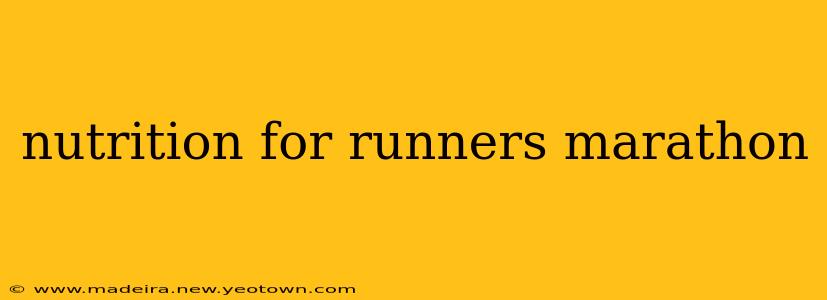The roar of the crowd, the pounding of your feet, the burning in your lungs – the marathon is a crucible that tests your physical and mental limits. But long before you cross that finish line, your success hinges on a crucial element often overlooked: nutrition. This isn't just about eating enough; it's about fueling your body strategically for peak performance, recovery, and injury prevention. Let's delve into the science and strategy behind marathon runner nutrition.
My name is Alex, and I've been a competitive runner for over 15 years, logging countless miles and experiencing firsthand the power (and pitfalls) of proper nutrition. I've consulted with sports dietitians and learned from my own successes and failures, and I'm here to share my insights with you.
What Should I Eat Before a Marathon?
This question often triggers anxiety for runners. The key is to avoid anything too heavy or likely to cause digestive upset. Think easily digestible carbohydrates for sustained energy and a small amount of protein for muscle repair.
A typical pre-marathon meal might include:
- Oatmeal with berries: Provides complex carbohydrates for sustained energy and antioxidants.
- Toast with banana and peanut butter: A simple combination of carbohydrates, potassium, and healthy fats.
- Whole-wheat pasta with lean protein: A good source of carbohydrates and protein, best consumed the night before.
Crucially, you should test your pre-marathon meal plan during your training runs. What works for one runner might upset another.
What Should I Eat During a Marathon?
Marathon running demands consistent fuel. Ignoring this aspect guarantees a disastrous finish. During the race, you'll need easily digestible carbohydrates to replenish glycogen stores and electrolytes to maintain hydration and prevent cramping.
Popular options include:
- Energy gels: Convenient and easily digestible, providing a quick burst of carbohydrates.
- Chewing gels: Less concentrated than energy gels, offering a more palatable option.
- Sports drinks: Replenish fluids and electrolytes lost through sweat.
- Bananas or other easily digestible fruit: Provide natural sugars and potassium.
What Should I Eat After a Marathon?
Post-race nutrition is paramount for muscle recovery and replenishing glycogen stores. Your body is depleted, and needs urgent replenishment.
Focus on:
- Carbohydrates: Replenish glycogen stores with readily available carbohydrates such as rice, potatoes, or pasta.
- Protein: Repair muscle damage with lean protein sources like chicken, fish, or beans.
- Electrolytes: Restore electrolyte balance with sports drinks or electrolyte tablets.
How Important Are Carbohydrates for Marathon Runners?
Carbohydrates are the primary fuel source for endurance activities like marathons. They're crucial for maintaining energy levels throughout the race. Without sufficient carbohydrates, you risk "hitting the wall," a sudden drop in energy levels caused by depleted glycogen stores. Prioritizing complex carbohydrates in your diet is key.
What Vitamins and Minerals Are Important for Marathon Runners?
Several vitamins and minerals play crucial roles in supporting marathon training and performance. These include:
- Iron: Essential for oxygen transport in the blood.
- Calcium: Crucial for bone health, particularly important during high-impact training.
- Vitamin D: Important for bone health and immune function.
- B Vitamins: Essential for energy metabolism.
Consult a doctor or registered dietitian to determine your individual needs.
How Much Water Should I Drink Before, During, and After a Marathon?
Hydration is critical for marathon runners. Dehydration can significantly impair performance and even lead to serious health problems. The amount of water you need depends on factors such as your body weight, sweat rate, and climate.
- Before: Start hydrating days before the race, gradually increasing your fluid intake.
- During: Sip water or sports drinks regularly throughout the race to replace fluids lost through sweat.
- After: Replenish fluids lost during the race by drinking plenty of water and electrolytes.
What About Supplements for Marathon Runners?
While a balanced diet is the cornerstone of marathon nutrition, some runners might benefit from supplements. However, it's crucial to consult a healthcare professional or registered dietitian before taking any supplements. Improper supplementation can be harmful.
Remember, marathon nutrition is a highly personalized journey. This guide provides general recommendations; what works for one runner may not work for another. Experiment with different strategies during training, listen to your body, and always consult with a healthcare professional for personalized advice. Your body is a finely tuned machine—fuel it correctly, and it will reward you with your best performance yet.

